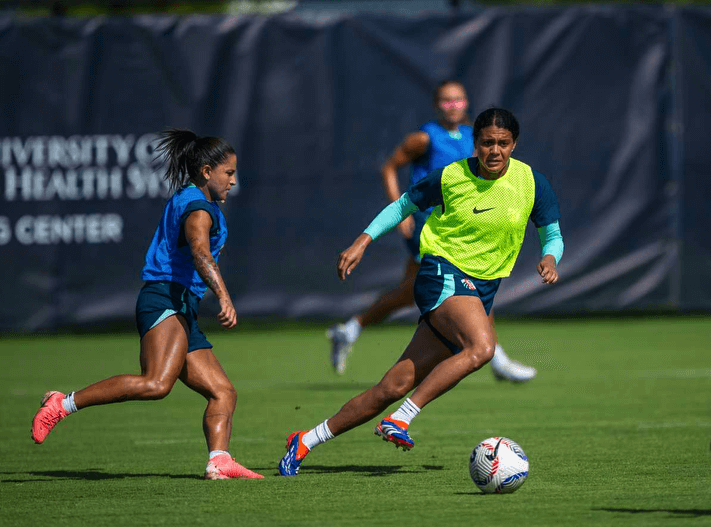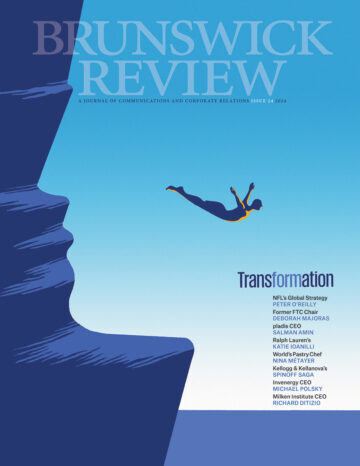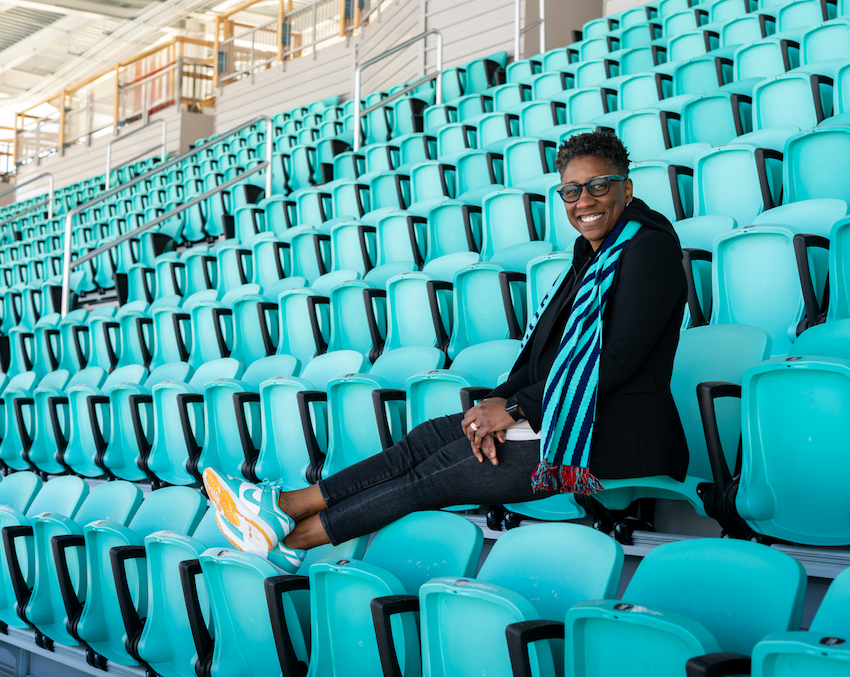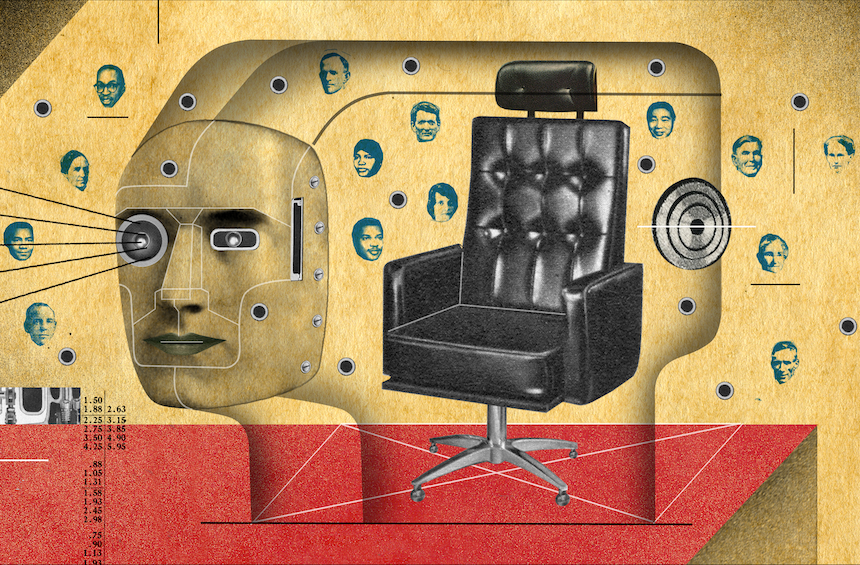A veteran executive of men’s teams and leagues, she now serves as President for a professional women’s soccer team. The numbers all point in the same direction, says Raven Jemison: “Women’s sports is a smart business investment.”
From ticket sales to the office of the President, Raven Jemison climbed the ranks one team, one league at a time. From the Florida Panthers of the National Hockey League to Major League Baseball’s Pittsburgh Pirates, then to the San Francisco 49ers of the National Football League before joining the National Basketball Association, then the Milwaukee Bucks, with whom as Executive Vice President she won a national championship.
Now Jemison is President for the KC Current of the National Women’s Soccer League (NWSL). The Current, whose co-owners include former college soccer player Brittany Mahomes and superstar Kansas City Chiefs quarterback Patrick Mahomes, recently unveiled the first stadium in the world purpose-built for a professional women’s soccer team.
“First and foremost, Raven shares a vision with us for how sports—women’s or men’s—can impact a community and beyond,” say Current co-owners Angie and Chris Long. “Raven’s leadership, operational expertise and commitment to excellence make her the perfect partner for us in executing and capitalizing on the tremendous opportunity in front of all of us in women’s sports.”
After finishing last season near the bottom of NWSL rankings, the Current this summer have stood near the top, an improvement in which Jemison takes deep pride. “I cannot take credit at all for what happens on the pitch. I am just blessed,” Jemison says in a conversation with Brunswick Review Editor Kevin Helliker, a Kansas City native and serious fan of his hometown teams.
“Off the pitch, I am blessed to work alongside amazing individuals every single day—making sure our stadium is full every match, making sure our match day experience is one we can be proud of, making sure that people come back week over week. None of that would happen without the work my teams and I do every single day. That said, winning definitely helps. It is additive. It makes doing business easier. As for whether I’m a good luck charm, that’s for somebody else to say.” With a smile, she adds, “The Milwaukee Bucks did win a championship my first year there.”
Jemison is the author of a new book, More Than Representation: The Cheat Codes to Own Your Seat at the Table, that tells how she survived and thrived as a Black, queer woman in the world of men’s sports.
One strategy, of course, was hard work: At one sports team, she got to know the CEO because he was the only person in the company gym at 6 am—except Jemison.

Your book is well written and left me feeling hopeful, despite its unflinching look at injustice. How have you stayed hopeful, focused and determined?
Thank you for buying the book and letting me know that my sleepless nights were not in vain.
For me, being hopeful is simple. Not easy, but simple. I’ve been blessed in my life. I have been surrounded by so many people who have buoyed me in times where I questioned myself, the path I was on. As I write in the book, I was supposed to be an optometrist, not someone selling tickets and entertainment.
What remained consistent at every turn is the support circle that I’ve had around me, and the ability I’ve always had to lean on my support circle both when times are amazing and when times are not. When times get tough, I remind myself who the heck I am and where I came from. I am standing on the shoulders of so many folks. My dream is their dream. There’s a lot that goes into it that makes me super excited. Every single morning, I wake up grateful that I get to do this work.
What you just said reminded me of the dedication page in your book: “To my ancestors known and unknown, you live in me. I’m eternally grateful for your endless sacrifice. I humbly pray that I am making you proud.”
Hearing you read back to me what I wrote, I feel emotional. Not to get too deep, but as a descendant of enslaved Africans, there are folks who did not make the treacherous journey, so to speak, here to America.
But there are folks who did. And to know that their DNA is in me and that they could not even fathom the life I get to live and the folks I get to work with every day and the work I get to do—I am eternally grateful for the sacrifices they made.
Known and unknown. There are several people who are no longer with me whose shoulders I stand on as well. I know specifically the sacrifice that folks like my grandmother made so that her seven kids could have kids, so they could live this life I get to live every day.
That dedication is not just something for the book. It is something I take with me every single day. I literally hope and pray that I do make them proud.
As president of a club that personifies a surge in women’s sports, what other evidence do you see?
I’m having conversations with other leaders of women’s sports teams and leagues. This stadium, this team, they are looking at an example of what is possible. Now that the blueprint has been created, they’re asking, “How do we do it too?” People from around the world are coming to our matches, touring our stadium, touring our training facilities and seeing firsthand what is possible when you invest in world-class athletes.
You have worked for an amazing variety of leagues. Is there a thread that has run through those jobs?
A couple of things are definitely the same, no matter what league you’re in. Women’s sports or men’s, the goal is to drive attendance, sell sponsorships and ensure people are engaged with your team from a branding and broadcasting perspective.
The difference in my previous life, in the core four men’s leagues, was that they were well-established. You knew people were watching. You knew the teams that had been there for decades. The leagues had been there for decades. The establishment had been created.
To me, the beauty of where we are in women’s sports is that it is a relatively blank slate to create. We can learn from the decades of the establishment to say, not only what is the same but what can be different as we educate the world on the smart business that is investing in women and women’s sports.
Now, in women’s sports, people are watching. They’re watching world-class athletes and acknowledging that along the way. It’s clear now that women’s sports is a smart business investment.
Representatives of big brands used to work with women’s sports as the right thing to do. It was a community asset. It was just a side note. Now, those brands are really taking this seriously to say what it means to align their brand with women’s sports. We want to keep that ball rolling forward. That’s the fun of it all.
“Representatives of big brands used to work with women’s sports as … a side note. Now, those brands are really taking this seriously to say what it means to align their brand with women’s sports.”
In your view, investors, both in sponsorships and team ownership, ought to be looking at women’s sports?
100%. When I think about the brands we’ve aligned with, whether it’s United Way front-of-kit, whether it’s CPKC Stadium and our partnership with CPKC, whether it’s Helzberg Diamonds, they have learned. They’re in on the ground floor.
Proof is in the pudding, and the value is clear in the metrics we put in front of them—earned media value, the return on their investment only eight matches into this season. And we are becoming more sophisticated in the way we tell that story to brands.
We have an outstanding ownership group, Angie and Chris Long, Brittany and Patrick Mahomes. Angie and Chris are investors by day. If Angie and Chris Long are investing their dollars in women’s sports and in privately financing facilities for women, then I would say, they’re onto something and other people will follow suit.
Is it realistic today for young girls to dream of a career in sports?
Yes, it really is. When a city, when a region, when a nation honestly rallies around an endeavor of the sort we’ve taken upon ourselves here with the Kansas City Current, there’s good reason for little girls to dream.
Also little boys, who are friends with those little girls, who are showing their support for these women as well. There was a photo that was captured at our last match of Alex Pfeiffer, who was one of our youngest players, signing a young boy’s jersey or kit.
And that to me just illustrates where we are right now. This is a movement, and there will be young boys and young girls who grow up with equal opportunity to live out their dreams professionally. You’ll hear people say, “Hey, the best athlete in my high school class plays professional soccer—women’s soccer.” It’s becoming the norm that we’re not just talking about firsts. We’re just talking about great athletes.
When I watch our matches, I’m looking at phenomenal athletes, and they happen to be women. And they deserve everything that has been only given to men before now. I look forward to the day that we just appreciate what we’re watching for what it is.
We’ve talked about young girls dreaming about careers as athletes. What about in sports management?
First off, if you’re playing sports as a young girl, or you’re the parent of a young girl who is interested in sports, 100% support her in all of those endeavors. If a professional career is not the future on the pitch, on the court, on the ice or on the field, there are options off the pitch, off the ice, off the field that one would say are equally suited for those that played sports.
Many of the folks I work alongside off the pitch were athletes. I work with a two-time Olympian and I work with somebody who stopped playing volleyball when they were nine years old. But the foundational point of having worked with a team, understanding what a mission is, understanding what the goals are, understanding that winning is possible, all those are created through sports and athletics.
I love hiring athletes, absolutely love it, because they understand what it means to work as a team, what success looks like, and how hard you need to work to be able to accomplish that success.
More from this issue

Transformation
Most read from this issue

Transformation of Search





